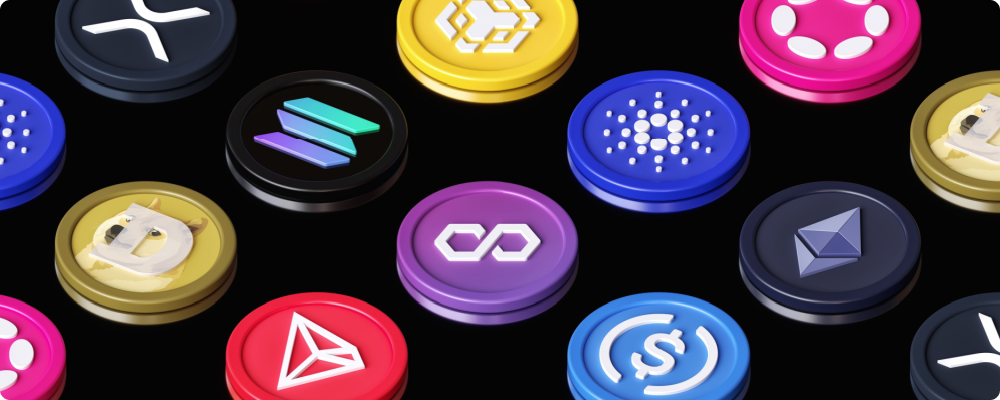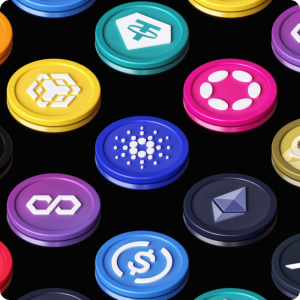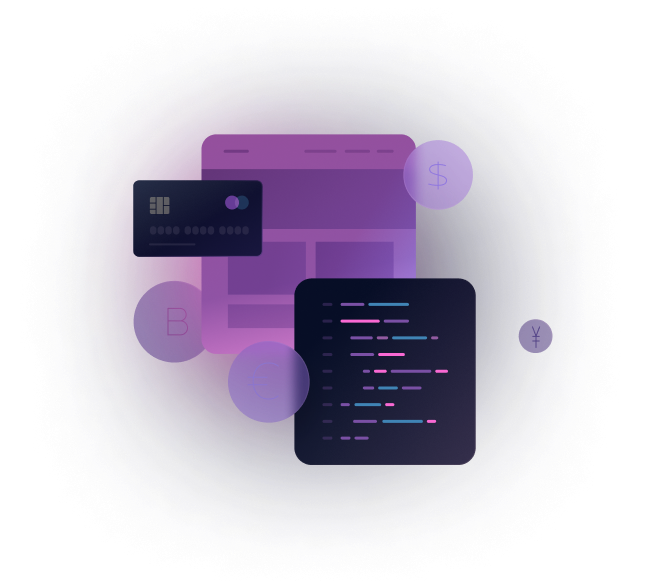

Beyond the Bitcoin Bubble: Altcoins' Expansion in Web3
December 4th, 2023 | 6 minsIn the ever-evolving crypto landscape, the surge of altcoins marks a new era of digital currency diversity, challenging Bitcoin's dominance. Among these, platforms like Meld stand out, offering developers innovative tools to integrate and leverage the burgeoning spectrum of altcoins within the Web3 revolution.
Understanding Altcoins
Altcoins are the successors of Bitcoin, stepping onto the cryptocurrency stage with an array of specialized functions and roles. Born from the digital currency boom, these alternatives to Bitcoin offer a spectrum of features that address different needs within the market. While Bitcoin is often seen as a store of value, akin to digital gold, altcoins diversify the landscape with their unique capabilities. They facilitate faster transactions, enable smart contracts, and often focus on privacy, to name a few. This specialization allows them to serve as more than just digital cash; they're tools that unlock new possibilities in the Web3 space.
As the crypto environment matures, altcoins are becoming increasingly significant, offering a more nuanced and sophisticated approach to what digital currencies can achieve. They're not just following in Bitcoin's footsteps—they're paving new paths for the future of finance.
Offer your customers a wide range of stablecoins across 100+ chains and 40+ payment methods through Meld! Learn more here
Types of Altcoins
Proof-of-Work Altcoins
Examples include Litecoin, which are mined similarly to Bitcoin, aiming for improvements in transaction speed or mining efficiency.Proof-of-Stake Altcoins
Represented by Cardano and Polkadot, these focus on energy efficiency by allowing coin holders to stake their currency to support network operations.Utility Tokens
Ethereum's Ether is a notable utility token, used to operate decentralized applications and manage smart contracts on its network.Privacy Coins
Monero and ZCash are dedicated to ensuring transactional privacy, offering users heightened anonymity in their crypto dealings.
Diverse Use Cases of Altcoins
From creating self-executing agreements to enhancing user privacy, these tokens are the key to unlocking the full potential of blockchain technology. Here's how they're making a difference:
Smart Contracts & Decentralized Applications
Cardano's ADA token is at the heart of its platform, which aims to deliver more advanced features than any protocol previously developed, for hosting smart contracts and decentralized applications with a multi-layer architecture.Privacy & Anonymity
Monero uses ring signatures and stealth addresses to obscure transaction details, ensuring that transaction parties and amounts are kept confidential, catering to users requiring discretion.Interoperability & Cross-Chain Transactions
Cosmos employs its ATOM token within a network of independent blockchains, facilitating interoperability and enabling tokens to be exchanged across various platforms without intermediaries.Scalability Solutions
Scalability-focused altcoins like Algorand use their native tokens to support a high rate of transactions and smart contracts, ensuring performance doesn't decline as the network grows.Niche Market Solutions
VeChain's VET token is utilized to track supply chain logistics, authenticating products to prevent counterfeiting and ensuring quality control across the supply chain.
Differences Between Stablecoins and Altcoins
The cryptocurrency landscape is diverse, with stablecoins and altcoins occupying distinct niches within the market. Here's a closer look at how they differ:
Price Volatility
Stablecoins are engineered for stability, often pegged to fiat currencies like the U.S. dollar, aiming to mirror the value of these underlying assets closely. Altcoins, on the other hand, can be subject to intense price swings influenced by market sentiment, technological developments, and global events.
Regulatory Landscape
Stablecoins often face More regulatory scrutiny due to ties with traditional financial systems. Altcoins encounter a varied regulatory environment that is heavily influenced by their use case, the jurisdiction of their creation, and their technological framework.
Liquidity & Market Adoption
Stablecoins typically enjoy high liquidity, thanks to their role as a bridge between fiat and cryptocurrencies and their integral function in trading pairs. Altcoins exhibit a wide range of liquidity levels; some are highly liquid and easily traded, while others may struggle with lower trading volumes and market presence.
Meld: Your Crypto Stack as a Service
With Meld's Crypto Stack, developers can offer their users an extensive range of altcoins, ensuring coverage across a broad spectrum of chains and tokens. Give your users the choice to purchase altcoins using familiar, region-specific payment methods, including options like IMPS or Alipay. Meld’s Crypto Stack let’s developers get the widest coverage across countries, fiat currencies, tokens, and payment methods with just a single integration.
Learn more about how Meld is helping developers unlock crypto here
Conclusion
Altcoins are much more than mere alternatives to Bitcoin; they are pivotal players in the evolving digital economy. Their diverse functionalities, from powering smart contracts to enhancing privacy, mark a significant leap in the cryptocurrency landscape. Meld's Crypto Stack amplifies this impact by providing access to over 700+ altcoins across an impressive array of over 100+ chains.
As this digital currency revolution continues, the role of altcoins is set to become increasingly central, not just as investment vehicles but as foundational elements in the burgeoning world of Web3 and beyond.
Meld is empowering developers to build a Multi Vendor Stack and launch faster than ever! Learn more about how to launch in weeks instead of sprints here.
FAQs
1. What is a Polygon Wallet and How Does It Enhance Crypto Transactions?
A Polygon wallet is a specialized digital wallet designed to store and manage Polygon (MATIC) tokens. It offers seamless interaction with the Polygon network, enabling faster and more cost-effective transactions. Users can benefit from its advanced features like direct access to decentralized applications (dApps) on the Polygon ecosystem.
2. What Distinguishes USDC and USDT Stablecoins from Other Altcoins?
USDC (USD Coin) and USDT (Tether) differ from typical altcoins by offering dollar-pegged stability. USDC is known for its transparency with regular audits and full reserve backing. USDT, managed by Tether Limited, has faced scrutiny over its reserve claims. These stablecoins provide stability in the altcoin market, unlike others that may have more volatile prices but offer diverse functionalities.
3. How Do Altcoins Compare to USDC Coin in Stability and Usage?
Altcoins offer diverse functions from smart contracts to privacy, while USDC Coin, a stablecoin, is pegged to the US Dollar for minimal volatility. The contrast lies in their market stability, regulatory landscapes, and technological frameworks.
4. What Impact Do Altcoins Like AVAX and Solana Wallet Have on Finance?Altcoins such as AVAX, along with platforms using Solana Wallets, revolutionize finance with improved transaction speeds, scalability, and security. These innovative altcoins and wallet technologies mark a significant departure from traditional cryptocurrency norms.


